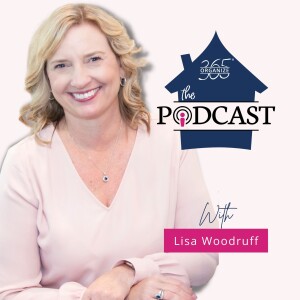
It's time to add a new term to our organizing glossary: passive organizing. I've said for years that it really takes three years to get organized, but the first 12-18 months are not easily recognized in that process. The reason is that this first chunk of time is spent in passive organizing.
What is passive organizing? Passive organizing is the time period during which you're becoming aware that maybe organization could help you become more productive. Maybe organization could help you get back your time. You're thinking, you're researching, and you're listening. This is passive organization. The change is happening in your mind, in your emotions, in your heart, and in your beliefs.
Passive organizing is the "pink" work of organizing. This is the time frame when you're working on yourself. You haven't committed to organizing, but you're gathering information and working on your mindset. You're thinking about the when, the how, and the order. You're deciding who you want your teacher to be.
In passive organizing, you're consuming exorbitant amounts of information. Sometimes, this can cause information overload and paralysis. You might struggle to take action because you see the best in all the options.
Let's take a little rabbit trail. The Kolbe Assessment is a quantitative test that helps you determine how you think. Among other things, it tells you how you leverage these three areas of thinking and processing in order to complete a project:
- How much do you need to research something before you can do it?
- How much structure do you need before you can take action?
- How much do you need to talk before taking action?
I am a "quick start." I spend the majority of my time talking about a project and then the active work portion of the project comes out really quickly at the end. I verbally process everything and I change my mind a lot. My team on the other hand tends to be much higher in research and/or structure.
An example of this is how I wrote the book How ADHD Affects Home Organization. I completed the writing of the book in a weekend, but I spent two years preparing to write the book and talking about it first!
How much research, structure, and talking do YOU need before you can take action on getting organized?
The other obstacle to deciding to get started with organing is having a tipping point. You have to reach a point when the pain of continuing to live in the current state of life is greater than the pain of change and learning a new skill to get the result you want. You have to realize that organization is a learnable skill.
Another tipping point is a golden window. These are big life events: a milestone birthday, a new baby, a new house, a new job, a loss, a health diagnosis, etc. Many times, multiple big events happen at the same time. These are seasons of opportunity. Disorganization leads to more disorganization, but when you seize the opportunity, these are major turning points.
I want to remind you that I was once where you are. Back in 2012, I quit my teaching job, I was overweight, I was depressed, and everything was falling apart around me. You can read my story in Organization is a Learnable Skill and listen to my depression story in episode #69. I was negative and pessimistic. You would not have wanted to be my friend back then. What you see of me now is the after picture!
You must also believe that you can get organized. You must make a decision that you are now going to live proactively instead of reactively. This is where you draw a line in the sand and step over it.
And one day, you will find yourself listening to an Organize 365® Podcast episode and you just get up and start organizing while you listen instead of just gathering information!
Are you ready to draw your line and get started on your organizing journey?
Resources Mentioned in This Episode- The Kolbe Assessment
- Book: How ADHD Affects Home Organization
- Book: Organization is a Learnable Skill
- Get Started: The Sunday Basket® System
- Get Started: The Productive Home Solution™
- #69 - My Depression Story
- #242 - Golden Windows of Organizing Opportunity
Did you enjoy this episode? Please leave a rating and review in your favorite podcast app. Share this episode with a friend and be sure to tag Organize 365® when you share on social media!
More Episodes
 2024-02-23
2024-02-23
 2024-02-09
2024-02-09
 2024-01-31
2024-01-31
 2024-01-24
2024-01-24
 2024-01-17
2024-01-17
 2024-01-10
2024-01-10
 2024-01-05
2024-01-05
 2024-01-04
2024-01-04
 2024-01-03
2024-01-03
Create your
podcast in
minutes
- Full-featured podcast site
- Unlimited storage and bandwidth
- Comprehensive podcast stats
- Distribute to Apple Podcasts, Spotify, and more
- Make money with your podcast
It is Free
- Privacy Policy
- Cookie Policy
- Terms of Use
- Consent Preferences
- Copyright © 2015-2024 Podbean.com




